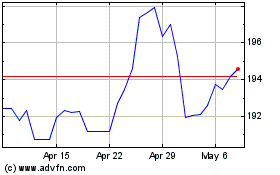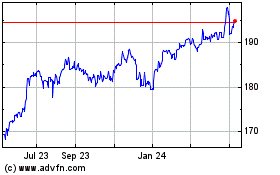Pound Higher After Upbeat U.K. Retail Sales Data
26 March 2021 - 6:19PM
RTTF2
The pound gained ground against its major rivals in the European
session on Friday, as the nation's retail sales recovered in
February largely driven by non-food store sales and on improved
risk sentiment amid progress on vaccination rollouts and upbeat
economic data.
Data from the Office for National Statistics showed that retail
sales volume including auto fuel logged a monthly growth of 2.1
percent, in contrast to January's 8.2 percent decrease. The pace of
growth matched economists' expectations.
Excluding auto fuel, retail sales gained 2.4 percent on month,
in contrast to the 8.7 percent decrease seen in January and faster
than the forecast of +1.9 percent.
Non-food stores provided the largest positive contribution to
the monthly growth in February.
On a yearly basis, retail sales fell at a slower pace of 3.7
percent after decreasing 5.9 percent in January. This was the
second consecutive drop in sales and was better than the expected
drop of -3.5 percent.
Excluding auto fuel, retail sales were down 1.1 percent
annually, following a 3.7 percent drop seen in the prior month.
Economists had forecast an annual fall of 1.5 percent.
The U.S. recovery appeared to be on track after latest data
showed a bigger-than-forecast drop in weekly jobless claims and GDP
revising slightly upward to an annualized rate of 4.3 percent in
the fourth quarter.
In his first formal news conference, U.S. President Joe Biden
promised to deliver 200 million doses of Covid-19 vaccine within
his first 100 days in office.
The pound hit 1.2969 against the franc, its strongest level
since March 15. If the pound rises further, 1.31 is likely seen as
its next resistance level. The pound appreciated to a 3-day high of
1.3791 against the greenback, from yesterday's close of 1.3731. The
pound is likely to challenge resistance around the 1.40 level.
The pound spiked higher to a 1-week high of 151.00 against the
yen, compared to Thursday's closing value of 149.91. On the upside,
153.00 is possibly seen as its next resistance level.
Data from the Ministry of Internal Affairs and Communications
showed that Tokyo's consumer prices declined at a slower pace in
March.
The core consumer price index, excluding food, dropped 0.1
percent year-on-year in March. The annual rate was forecast to fall
0.2 percent after easing 0.3 percent in February. Core prices have
been falling since August 2020.
The pound jumped to 0.8548 against the euro, recording a 1-week
high. The pair had ended Thursday's deals at 0.8563. The next
likely resistance for the pound is seen around the 0.84 level.
Looking ahead, U.S. personal income and spending data for
February and University of Michigan's final consumer sentiment
index for March will be featured in the New York session.
Sterling vs Yen (FX:GBPJPY)
Forex Chart
From Mar 2024 to Apr 2024

Sterling vs Yen (FX:GBPJPY)
Forex Chart
From Apr 2023 to Apr 2024
